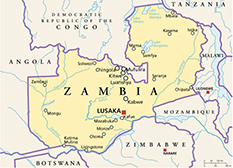AIR in Zambia
 In 2001, AIR began a partnership with the Zambian Ministry of Education to assist with information management, education planning, and assessment of learning outcomes in light of the country’s new competency testing initiative. Since then, our work in Zambia has expanded to respond to, among other needs, the infrastructure challenges in education, poor learning outcomes in critical areas such as reading, and high pupil-to-teacher ratios, among other needs.
In 2001, AIR began a partnership with the Zambian Ministry of Education to assist with information management, education planning, and assessment of learning outcomes in light of the country’s new competency testing initiative. Since then, our work in Zambia has expanded to respond to, among other needs, the infrastructure challenges in education, poor learning outcomes in critical areas such as reading, and high pupil-to-teacher ratios, among other needs.
AIR is deeply committed to working in Africa including our hub office in Kenya, which provides an operational base for AIR to conduct high-quality work.
AIR’s research and evaluation work in Zambia and Southern Africa includes multi-method impact and process evaluations across many sectors such as WASH (water, sanitation, and hygiene), health and social protection, early childhood development, nutrition, and education.
Our approach to implementation, technical assistance, and capacity building is based on translating rigorous research and evaluation into evidence-based practices that enhance education and social development. In Zambia and Southern Africa, our work spans a range of program and policy areas including early-grade reading, standards assessment, educator professional development, girls’ education, e-learning, HIV/AIDs prevention and services, and more.
Cash Transfer Programs
Cash transfers are international development programs where donors or governments can give cash directly to targeted groups. The Multiple Category Transfer Grant program provides grants directly to poor, labor-constrained households, and the Child Grant cash transfer program provides grants directly to poor households with children under five years old. These programs empower families to decide how best to meet their needs. AIR conducted impact evaluations on these programs and found gains greater than the value of the transfer size themselves.
Cash Transfers Explained: How Cash Empowers Poor Families in Zambia
In this video, David Seidenfeld dispels the myth that such programs create dependency and are a waste of money.
Education Programs
With a high poverty rate, poor technical infrastructure, and difficulty providing service to and accessing information from remote and disadvantaged areas, Zambia faces many challenges to building a quality education system. Since 2002, the government has sought to achieve increased and equitable access to quality education at all levels through a variety of policy decisions, initiatives, and programs. These initiatives have included the Zambia eSchool 360 Expansion Project, Zambia Education Quality Improvement Project 2 (EQUIP 2), quality improvement projects, inclusive development assistance strategies, learner performance programs, health education, and more.
Health Programs
HIV care, treatment services, and education programming has significantly improved and increased over the last 10 years in Zambia. Despite these improvements, HIV incidence does not seem to be decreasing among adolescents in Zambia. Adults and children experience barriers to HIV treatment, and the education sector continues to struggle implementing effective HIV prevention.

AIR participates in the Community ART for Retention in Zambia: Evaluating Antiretroviral Therapy Care Models study. The study aims to develop and evaluate the effectiveness of innovative models of care delivery designed to reduce health systems barriers to care, and leverage community support to improve retention in HIV care and treatment programs. To further understand the public health dynamics in Zambia, AIR participated in the study, Estimating the Elasticity of Demand for Condoms in Rural Africa, which examined the role of price and access in affecting the demand for condoms in Zambia.
Early Childhood Development Programs
Large numbers of Zambian children suffer from nutrition-related disorders such as low birth weight, wasting, stunting, chronic malnutrition, and various nutrient deficiencies. AIR and its partners are evaluating the First 1000 Most Critical Days Program, which addresses these issues by targeting households with pregnant women or children under two for maternal and child nutrition and health services.

In resource-limited settings such as Southern Africa, malnutrition and infectious diseases need to be an integral part of thinking about early childhood interventions. AIR conducted a cluster-randomized trial to test the feasibility and preliminary impact of a package of community-based early childhood services in a rural area of Zambia through Improving Early Childhood in Zambia.
